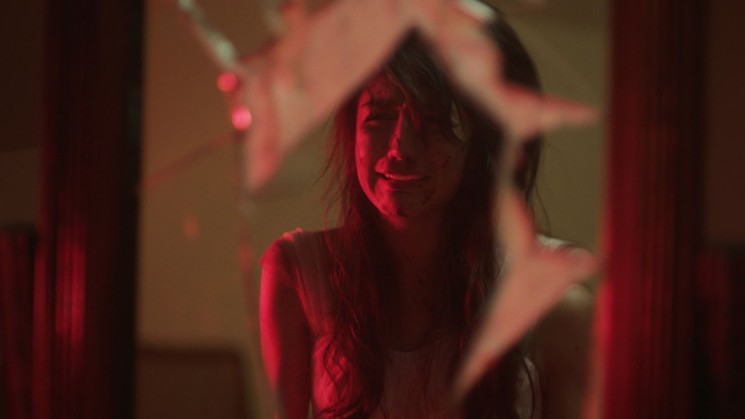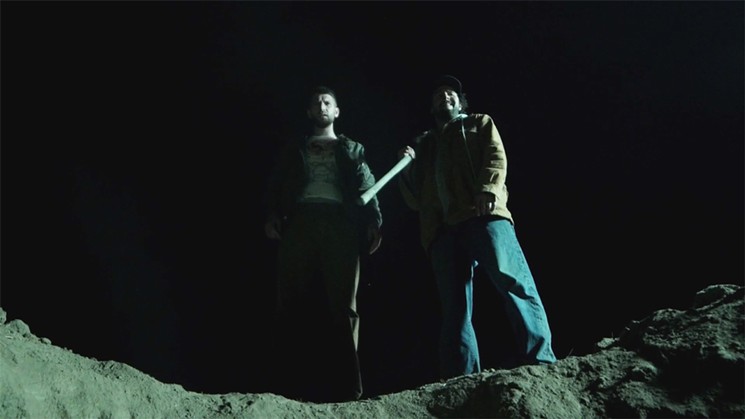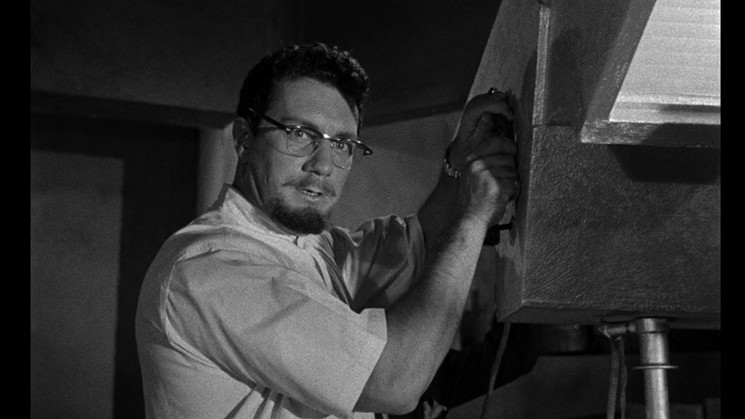Fifteen-year-old Alejandra Santos is about to celebrate becoming a woman, but the evening of her quinceañera will not be what she or anyone in her family expects. Her father is missing and a sinister figure from a Mexican cartel shows up at the celebration, threatening everyone with merciless, brutal violence.
A blood-splattering massacre ensues; in its aftermath the young girl and her abuela set out to get revenge, going on a rampage of their own that recalls Kill Bill with a little taste of El Mariachi and Machete dark humor for good measure. La Quinceañera is from a company called Luchagore Productions, known mostly for its horror films. It’s an uber-violent ride; raw and relentless yet reverent toward the culture and characters that provide its setting. It depicts a time-honored Mexican tradition, turns it on its head and leaves it for dead. Coco, this ain’t.
The series is just one dynamic and dramatic example of the offerings at this year’s Los Angeles Latin International Film Festival, back after a five-year hiatus. Billing itself as “the largest Latinx film festival in the United States,” LALIFF takes place June 20-24 at the TCL Chinese Theatre, with five days of programming featuring a broad selection of short- and long-form award-winning and emerging films. The event also will feature LALIFF Legacy, its first-ever student film festival (Saturday and Sunday); a music series (all week); and an art show curated by CultureStrike. This comprehensive, all-Latino approach makes the festival a powerful cultural event that was worth the wait.

“LALIFF has long been the most important Latino film festival in the U.S. But this time around, we’re making sure it becomes the mecca of Latino content,” the fest’s founder, Oscar-nominated actor Edward James Olmos, says in the event’s press materials. “The festival is a celebration of having our voices heard beyond the film screen, and we felt it crucial to bring the festival back to the place where it started — Los Angeles.”
Indeed, LALIFF, founded by Olmos in 1997, has helped launch the careers of many Latin actors, creators and filmmakers over the years, including Rafael Agustín, a writer on the hit CW show Jane the Virgin and an award-winning filmmaker and playwright. Agustín, who began his involvement with LALIFF as a volunteer and then moved on to manage the festival, is now its executive director. Volunteering changed everything for him.
“I was a student at UCLA when the late and great Lupe Ontiveros walked into my class. She told us that we should consider volunteering for LALIFF because it was one of the only places where the Latino industry and community came together. As she spoke to us, all I kept thinking was, ‘This woman killed Selena onscreen — I should probably do what she says!’ I’m glad I did,” Agustín says. He’s referring to Ontiveros’ role as murderous fan Yolanda Saldívar in the film Selena, about the iconic Tejano pop star, starring Olmos and Jennifer Lopez.
Agustín, who is of Ecuadorian descent, says LALIFF was critical in his formation as an industry professional. “Where else was a young Latino immigrant going to get his start in Hollywood? I was lucky to be mentored by Marlene Dermer and Edward James Olmos, both co-founders of LALIFF,” he says. “As a former undocumented student trying to figure out how to pay for higher education, I was scared of taking out too many student loans, so I literally commuted from West Covina to Westwood every day of my undergrad. My first year with LALIFF, I did the same commute from West Covina to Hollywood. My first job at LALIFF was moving tables and chairs for the youth program: a screen education program that took place at the festival.”
That program eventually gave birth to the Youth Cinema Project, LALIFF’s statewide, in-class educational film curriculum, which is having great impact on literacy, social empowerment and English-language redesignation for the students it reaches.
“We have worked in partnership with the LFI Youth Cinema Project for many years and continue to be impressed by the growth the students experience through their participation in this unique program,” says Ruben Garcia, an executive at mega-agency CAA, which is a sponsor of the student film festival. “As LALIFF looks to make its return to Los Angeles, we are excited that these young filmmakers of tomorrow will have the opportunity to share their work with our creative community through LALIFF Legacy.”

Leonissa Duarte, a 17-year-old, first-generation Mexican-American student from Bell Gardens High School, will be screening her film First Date, which she wrote, directed, edited and acted in at LALIFF Legacy. She says it was inspired by TV sitcoms such as Parks and Recreation and The Office. “I watch these shows religiously and I’m infatuated with the style of shooting and comedy,” she explains. “I thought it would be fun to shoot a high school–themed mockumentary. I developed characters inspired by personalities my peers often joke about.”
A two-year student of Youth Cinema Project, Duarte says the program nurtured her interest and passion for film and helped her to seek opportunities in the industry. She’s also grateful for the hands-on education YCP has provided, including work with professional-grade equipment. “I was able to learn and try my luck in all positions during my first year of instruction and apply them directly in my second year on my own film,” she says. “Through the program, I was able to establish connections with people within the industry who will help me, as a graduating student, join the film work force. I just enjoy filming so much that I would do literally anything. I’m completing an independent film that I have written and will direct this summer.”
Prepping Latin American students for a career in film is a huge part of LALIFF’s youth initiatives. But for some, it has meant even more that. Frida Cuello, a 10-year-old who just completed fourth grade at Helen Keller Elementary in the Lynwood Unified School District and was a first-year YCP student, saw the program change her life. Says her mother, Miriam Cuello, “It has given so much to her. She had depression for about two years. She had no motivation to do anything. … About six months after doing the program, her depression was gone. She’s so happy, and always talking about the project, and they loved her. Today I have a feeling she’ll always have a motivation.”
“It actually brought me out of the darkness,” Frida concurs. “I was very tense. I would cry sometimes. When I was doing this program it actually calmed me and naturally motivated me to want to do more. I started to play with my friends again at recess time instead of being lonely, crying and sitting by myself on the benches.
“I want to do this when I’m older,” the tween continues. “It’s really cool. I want to see what I can do to make longer films, not just shorts. And I’m going to the festival to see my other friends’ shorts and support them.”
The Legacy screening event will be geared toward youth-oriented storytelling, but the bulk of the festival explores more mature themes. La Quinceañera, screening Saturday night, is definitely an example of fare not for the niños, but it is one of LALIFF’s most provocative and potentially commercial endeavors.
Director Gigi Saul Guerrero and her company, Luchagore Productions, had garnered a nice following for their short film El Gigante, which screened for almost three years at festivals around the world. The opportunity to make her latest came about when a development executive at Stage 13/Warner Bros. saw the short on the fest circuit and contacted Guerrero. A short time later, Luchagore was pitching ideas to the senior vice president of scripted content at Warners. One of those pitches was the Quinceañera idea.
“Working on a studio project is like working on a whole other level. We learned so much more from what we already knew from film school,” Guerrero says. “Being able to get that experience working with the collaborative team at Stage 13 really helped [me] to see what they were looking for in a story, character and overall structure of a series.
“Our writer, Shane McKenzie, and I worked hard in creating a script that was not only what the studio was looking for but also kept the Luchagore signature we all love,” she adds.
The series was inspired by strong Mexican women, including inspiration from the featured song in the series, “Anoche Estuve Llorando,” by Lola Beltran. “It was so important for me to not only keep the fun and gritty Luchagore vibe alive, but to be honest to myself as an artist; to showcase my voice as a Mexican storyteller with my typical Tex-Mex horror vibe,” Guerrero says.

One of the most successful Latin filmmakers of all time, Robert Rodriguez, has been a big influence on many Latin filmmakers, among them Guerrero and another LALIFF filmmaker, Chris Carmona. Carmona’s Bad Labor will be featured at the fest on Thursday. The film, about a day laborer who takes a job with great pay, has a dark twist (OK, the day rate of $10,000 should have been a clue); it turns out to involve kidnapping, murder and a burial — and a terrifying drive to the desert with “the world’s strangest” hitman.
“I gotta start off by saying if Robert Rodriguez would’ve never written the book Rebel Without a Crew, based on the experience of making his first movie, El Mariachi, there absolutely would be no Bad Labor — straight up,” Carmona declares. “I found his book off chance when I was about to leave a Barnes & Noble. It was the subtitle that caught my eye: ‘How a 23-Year-Old Filmmaker With $7,000 Became a Hollywood Player.’ I was 19 at the time, so I thought, ‘I’m not too far from 23, and I’m dying to make a movie.’
“He ends the book with the line: ‘What are you doing still reading this? Go out and make your movie! I’ll bring the popcorn,'” recalls Carmona. “I vividly remember flinging the book to the wall in excitement and screaming ‘Yes!’ I texted my two partners right after: ‘Guys, this year we’re gonna make our first feature film! Get ready!’ Mind you, I’m always proposing outrageous ideas like this to them outta the blue so, knowing me, they just wrote back, ‘Cool, let’s do it!'”
The idea for his project struck Carmona during a Home Depot visit; he looked at the laborers waiting for work and thought to himself, “‘Man, these guys are really brave. You never know whose car you’re gonna get into,'” he remembers. “It clicked with me right then and there. ‘That’s a movie.’
“I told my partners, ‘If Robert Rodriguez could make a pretty good action movie in the ’90s for $7,000, we can do a GREAT one today for $700.'” Carmona was able to keep production costs so low in part by borrowing the El Mariachi model of writing things into the script that he knew he had access to, such as his dad’s truck, the Dodge Ram used in the driving scenes. “Nobody on that set got paid. I had to pull lots and lots of favors, something only a 19-year-old ambitious filmmaker could get away with.”

Another standout offering in the festival, exemplary of the thematic range and style showcased at LALIFF, is Samir (“Sami”) Oliveros’ Bad Lucky Goat, an unexpected adventure set in the Colombian Caribbean. The film, also screening Saturday, is about two siblings, Corn and Rita (played by first-time local actors), who accidentally hit a goat with their dad’s truck and have all kinds of intriguing encounters with random people — including a butcher, Rastafarian drum makers and a witch doctor — as they try to get the truck fixed and pick up tourists staying at their family’s hotel.
Born in Bogotá, Colombia, Oliveros studied film direction at the School of Visual Arts in New York. After graduation, Oliveros raised the $60,000 he needed to fund the film on Kickstarter. It premiered at SXSW in Austin, Texas, in 2017. The film went on to play at more than 50 festivals, including BFI London and TIFF Next Wave. He’s currently enrolled at AFI in Los Angeles and will complete his master’s program in directing in June 2019. And he’s working on a new film, Cactus Blossom, a love story about an old man trying to gain his wife’s love back by transforming into what she loves the most: a cactus.
LALIFF may represent the Latin experience, but the range of works can’t be codified in terms of genre, style or characters. There is comedy, drama, horror and combinations of all three, representing a range of ideas running the gamut from political to personal.
Complementing the cultural perspectives depicted at this year’s event, a related art installation titled “Con Cámaras y Sin Papeles” captures the resilience and creativity of undocumented artists in timeline format.
“As a Latinx and undocumented artist living in the U.S. under this current political climate, spaces like LALIFF are extremely important, and I am so happy to be part of it. A lot of the time, the rest of America learns about ‘the other’ through the Hollywood lens,” explains Julio Salgado, the artist projects coordinator at Los Angeles–based CultureStrike, who curated the festival exhibit component. “This means that a lot of the time, we do not have the tools to tell our own stories at such a massive scale. LALIFF is aiming to create a space that gives three-dimensional stories to the Latinx community through these films.”
LALIFF’s opening night will feature a screening of the documentary The Sentence, winner of the Audience Award for U.S. documentary at this year’s Sundance Film Festival and soon to be seen on HBO. Filmmaker Rudy Valdez explored the 15-year incarceration of his sister for conspiracy charges related to crimes committed by her deceased ex-boyfriend. Valdez started filming his family so his sister could experience what she was missing, but he ended up capturing more — the fight for her release during the last months of the Obama administration’s clemency initiative. The invite-only opening also will feature an event at the Roosevelt Hotel in Hollywood headlined by psychedelic cumbia fusion musical act Tropica Magica and The Mexican Standoff as the pre-opener, Boyle Heights DJ BSYDE, spins cumbia funk. Live music will be featured nightly after each screening as well.
Other highlights include Good Crazy, the directorial debut of actress Rosa Salazar (Alita: Battle Angel, FX’s American Horror Story: Murder House and the Maze Runner film series); The Borscht Corp. Collective, a series of short films including a piece from Academy Award–winning director Barry Jenkins (Moonlight); Candelaria, from director Jhonny Hendrix, set in Colombia and Cuba; Killing Jesus, from American director Laura Mora; and many more productions from Spain, Brazil, Cuba, Argentina, Puerto Rico, Dominican Republic and Costa Rica.

Paraguay’s The Gold Seekers, directed by Tana Schémbori and Juan Carlos Maneglia, closes the festival.
Two $5 special screenings will include the West Coast premiere of the restoration of Santo vs. Evil Brain (1961), a partnership with the Academy Film Archive; and the Uruguayan soccer movie Home Team, to celebrate the World Cup.

In addition to live music, art and screenings, other engagements include a free podcast event (“Live From LALIFF”) with Latinos Who Lunch and Locatora Radiointerviewing Tanya Saracho, the creator of Starz’s new original hit show, Vida, along with her cast. The success of the cable series with critics and audiences alike has shown the viability of Latin content, proving its appeal beyond ethnic niche markets and into the mainstream.
Ultimately mainstream recognition for all of LALIFF’s filmmakers is the goal. Edward James Olmos has found success and respect beyond his ethnicity, but he clearly still chooses roles that reflect the Latin experience when they’re good ones (he’s currently filming the FX Productions series Mayans M.C.). Nurturing future generations is about being an example of what is possible but it’s also about giving back, putting the spotlight on raw talent and fostering new talent by providing opportunity, something the often marginalized Latin community doesn’t get much of.
“At the first LALIFF, three young Mexican filmmakers — [Guillermo] Del Toro, [Alejandro] Iñárritu and [Alfonso] Cuarón — were there with their short films. In later editions, both America Ferrera and Gina Rodriguez had first films at LALIFF,” Agustín says proudly. “We don’t do LALIFF because we need it. We do LALIFF because our community deserves it.”
L.A. Latino International Film Festival, TCL Chinese Theatre, Hollywood; Thu., June 21-Sun., June 24; latinofilm.org. VIP pass, $300; industry pass, $150; LALIFF Music Series all-access, $75; Music Series single-day pass, $25; individual movie tickets, $12.



